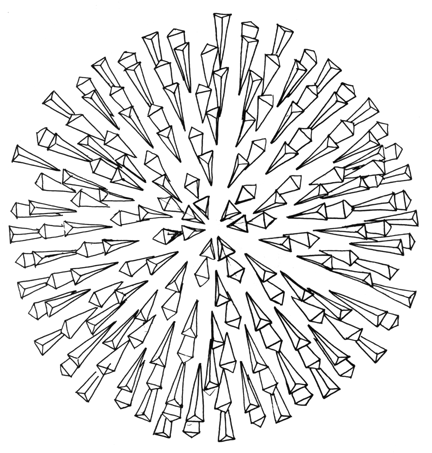comprehendere
- Suzanne Stenson O'Brien

- Sep 15, 2019
- 4 min read
drawing by R. Buckminster Fuller
At this time of year, autumn, I often turn inward. It's a time when I often evaluate myself, my life, my surroundings, my practices, and my thinking. There's something about closing the windows of my house that makes me more reflective. And since I am a person who is constantly asking myself "why" (Why?, you might ask. Good question!), I am often reflecting in a search for meaning. For instance, recently I have been reading about ayurveda, in Sanskrit, "The Science of Life". It is considered to be both a healing modality and a guide, with the end goal to be a state of balance. This is exactly why it appeals to me - balance is important to me and always has been. Even though we meander and bob and weave through life — or at least I do — balance is critical to life's continuation. And I've been thinking about balance a lot this month. My son's birth sign is Libra, the scales, and his birthday is coming up. Maybe that's why.
Balance can mean many things, such as a way of thinking about holding two opposing ideas at the same time (aka "non-duality"), or it can mean remaining in the middle rather than at the poles. Balance can be a kind of equilibrium, can refer to fairness and equity, or it can be a measurement tool. According to the Oxford English Dictionary, the word emerged almost simultaneously as an adjective, verb, and noun from the Latin - bilanx - two-plated scale. Such a scale was used in the 13th century, probably to ascribe a certain amount of value to a certain weight of goods, to be traded. It gets me thinking about what are we willing to trade for our own balance?
We tend to accept that balance is necessary in shallow ecology. Homeostasis, or a relatively stable equilibrium between interdependent elements, is required for each of our lives to continue: Fuel in, energy out; water in, water out; oxygen in, CO2 out; nutrition in, waste out. We are in touch with and attend to this balance on a continual, daily basis, even if we aren't thinking about it much, metabolizing as we go.
"Our responsibilities" allow us to perceive a similar need at a hyperlocal level: if our pantries are bare, or water pipes are broken, we cannot attend to the bodily needs of our loved ones, and would fall out of homeostasis in short order, without food or water. Many of us also feel a sense of balancing within our homes and in our communities. Are we giving back as much as we take? At a geographic scale, we call this "carrying capacity"; what is the carrying capacity of the land, of our Earth? The funny thing is, at a certain point of scale, when you step back far enough, the input to the largest system gets a little fuzzy. Indeed, at the scale of a planet, this becomes simple providence. There is no equilibrium, since everything provided by the Earth is taken. What is it we give back?
"Earth is a sphere. All our actions should be guided by this fact."
—R. Buckminster Fuller
Many religious philosophies, especially the oldest ones, have a sense of "the whole", and I think this is not accidental. I think it might be hard-wired into us. In my own thinking, considering the systems of our planet, our bodies, our lives, in truth everything is actually connected. Some people would call this sacred. In my part of the world, Wakȟáŋ Tȟáŋka is the indigenous Lakota sense of the power of sacredness that resides in everything. Something in the world possesses the quality of tȟáŋka. Or rather, all things do. (Side note for Black Panther fans: In the Omaha-Ponca language, this is called Wakanda!)
Some other religious traditions — traditional Christianity, for instance — look at this type of thinking as a heresy. In a statement on New Year's Day 2010, a Papal encyclical criticized this type of thinking — pantheism — for denying the "superiority of humans over nature and seeing the source of man's salvation in nature." Yet much of the language in this writing was about protecting creation. And herein lies part of our dilemma!
We must see ourselves as part of the world to have a vested interest in the continuation of the world and its resources. I personally feel we must also take into account nature's actual supremacy: Just ask the people in the Bahamas, whose homeland has been literally washed away by Hurricane Dorian. But acknowledging our part of the planet doesn't have to be sacrilege; indeed I imagine long term failure for that those traditions which perpetuate the separateness. I think we are on the cusp of change, where major leaders in many areas are starting to think and write and relate their own ideas and knowledge to what is happening at a broader scale. This, for instance: A Comprehensive Torah-Based Approach to the Environment.
There is so much to read and more to write on these topics, from Gaia theory to R. Buckminster Fuller's "Critical Path" to documentaries, magazines, and great thinkers. I would like to suggest that we crowdsource additions to this space as a library for big thinking. Let's gather information on ideas, writings, readings, podcasts, books, web sites and other information related to these ideas of "the whole". And who knows, maybe we can get together and talk about it?





Beautifully written. This fits my mood that thinking these days 100%.